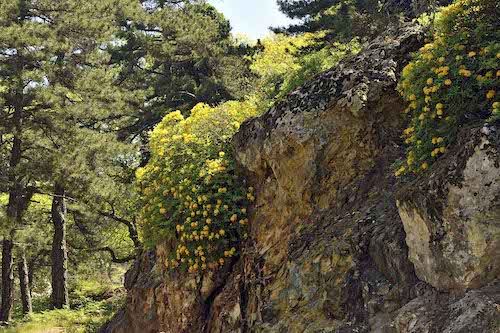Once upon a time an Arab visited a mosque in the kingdom of Tambora. He found a dog inside. In Islam dogs are considered as impure, so he ordered that the dog be kicked out. But he didn’t know it was the dog of the Radja of Tambora, who in turn became very angry at this afront. Radja had (another) dog killed and then invited the Arab to dinner. Only after the meal did Radja tell the Arab what he had been eating, causing the Arab to go mad. Then the Radja had the man brought up to the volcano and thrown into the crater. The volcano became incensed about this murder and immediately started spewing fire, rocks and lava. Since then nothing has been seen of the kingdom of Tambora.
This of course was not a Greek myth, but an Indonesian one. Not even that old, because the legendary outburst of the Tambora volcano on the Indonesian island Sumbawa was in 1815. This was such a violent event of nature that the whole world became disordered: heavy rainfalls caused ruined harvests; in New York tropical birds fell from the skies and Switzerland suffered famine because crops were eaten by torrents of spiders, caterpillars and beetles. For years after Europe could enjoy blood red sunsets. There are even people who conjecture that Napoleon lost the battle of Waterloo because of this eruption: his weapons became stuck in the mud caused by the heavy downpours. Thanks to this dramatic event the year 1816 is now known as the year without a summer.
So it is possible to skip a summer. While all scientists talk about the warming of the earth, the difficult start of the summer in Greece this year could very well have another cause. One of the best weathermen in Italy, who not only presents his weather talks on television, but is also a Lieutenant Colonel in the Italian air force and who sometimes gives meteorological advice to NATO, is Guido Guidi. He opines that the difficult start of this summer in Greece, the heavy rains in Italy and other meteorological disturbances in the Mediterranean could have been caused by the heavy outburst of the Hunga Tonga-Hunga Ha’apai on Tonga, in January last year. According to him we do not have to worry about heat waves until at least mid July.
So here we are feeling cold on the sunbeds at the pool and the sea. The sea a bit cold and clouds refusing to leave the celestial vault. Although most people are not that unhappy about the (by Greek notions) cool temperatures.
It’s not only humans who make a mess of the world: it’s Earth also (as told in that Indonesian myth). In Greece the most dangerous volcano is on Santorini. Recently there has been a discovery of a new lava chamber of the volcano underwater, making scientists say that it is very possible that within 150 years the volcano could become active again. The earth has right to protest about this island: where poor donkeys carry well-fed tourists to the top of the mountains all day long and where the high prices have chased away Greek tourists who cannot even afford a coffee there anymore. Now even the international tourists have started to avoid the island because of the exorbitant prices — just like Mykonos, an island which suffers from even bigger price madness.
Mykonos and Santorini are filled up with all kinds of luxurious villas and hotels and these islands have now been ‘presented with the bill’: blinded by money the inhabitants have sold their islands to the devil and even though many illegal buildings are now being demolished — Nature has been seriously spoiled.
Even on Lesvos prices are on the rise. Already this summer some restaurants have dared to double their prices. They clearly are under the same spell as Mykonos. The money-grubbers have arrived; they have bought plenty of dilapidated restaurants and hotels. There is nothing wrong with modernizing the island, it needs it. However, let’s hope these rich people show some respect for local culture and history and do not see this beautiful island only as a good investment, as witnessed on Mykonos. Remember — Lesvos has dormant volcanos. Let’s not kiss them awake, we might lose more summers.











